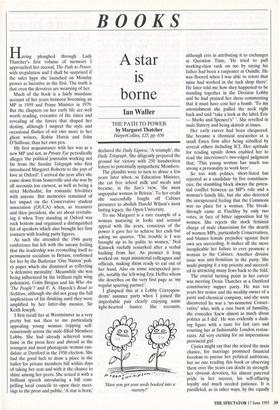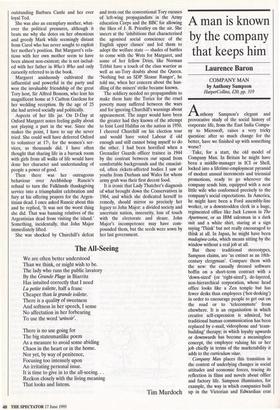BOOKS
A star is borne
Ian Waller
THE PATH TO POWER by Margaret Thatcher HarperCollins, £25, pp. 656 Having ploughed through Lady Thatcher's first volume of memoirs I approached her second, The Path to Power, with trepidation and I shall be surprised if the sales hype she launched on Monday proves as lucrative as the first. The truth is that even the devotees are wearying of her.
Much of the book is a fairly mundane account of her years between becoming an MP in 1959 and Prime Minister in 1979. But the chapters on her early life are well worth reading, evocative of the times and revealing of the forces that shaped her destiny, although I suspect the style and occasional flashes of wit owe more to her ghost writers, Robin Harris and John O'Sullivan, than her own pen.
My first acquaintance with her was as a new MP and not, as Private Eye periodically alleges 'the political journalist working not far from the Sunday Telegraph who first introduced Margaret Roberts to the joys of love at Oxford'. I arrived the year after she came down from Somerville and she was by all accounts too earnest, as well as being a strict Methodist, for romantic frivolities with anyone. But memories remained of her impact on the Conservative student association (OUCA) when, as treasurer and then president, she set about revitalis- ing it when Tory standing at Oxford was rock bottom and organised a distinguished list of speakers which also brought her first contacts with leading party figures.
As such she attended the 1946 party conference but left with the uneasy feeling that the leadership was reconciling itself to permanent socialism in Britain, confirmed for her by the Butlerian 'One Nation' poli- cy paper which she dismissed as reflecting `a defensive mentality'. Meanwhile she was being influenced by the brilliant right wing polemicist, Colm Brogan and his Who Are The People'? and F. A. Hayeck's Road to Serfdom, although she did not grasp the full implications of his thinking until they were amplified by her latter-day mentor, Sir Keith Joseph.
I first recall her at Westminster as a very pretty but not then to me particularly appealing young woman tripping self- consciously across the male-filled Members Lobby. She had already achieved some fame in the press here and abroad as the youngest and most photogenic woman can- didate at Dartford in the 1950 election. She had the good luck to draw a place in the ballot for private members bill within days of taking her seat and with it the chance to shine among her peers. She seized it with a brilliant speech introducing a bill com- pelling local councils to open their meet- ings to the press and public. 'A star is born,' declared the Daily Express, 'A triumph', the Daily Telegraph. She diligently prepared the ground for victory with 250 handwritten letters to potentially sympathetic Members.
The plaudits were to turn to abuse a few years later when, as Education Minister, she cut free school milk and meals and became, in the Sun's view, 'the most unpopular woman in Britain'. To her credit she successfully fought off Cabinet pressures to abolish Harold Wilson's most lasting legacy, the Open University.
To me Margaret is a rare example of a woman maturing in looks and sensual appeal with the years, conscious of the power it gave her to achieve her ends but asking no quarter. 'The trouble is I was brought up to be polite to women,' Neil Kinnock ruefully remarked after a verbal bashing from her. As premier it long worked on most ministerial colleagues and officials, making them ready to eat out of her hand. Also on some unexpected peo- ple, notably the left-wing Eric Heifer whom she describes on the very first page as 'my regular sparring partner'.
I glimpsed this at a Lobby Correspon- dents' summer party when I joined the improbable pair clearly enjoying some light-hearted banter. She recounts, `Have you got your seeds booked into a nursery?' although errs in attributing it to exchanges at Question Time, 'He tried to pull working-class rank on me by saying his father had been a carpenter at Oundle. He was floored when I was able to retort that mine had worked in the tuck shop there'. He later told me how they happened to be standing together in the Division Lobby and he had praised her dress commenting that it must have cost her a bomb. 'To my astonishment she pulled the neck right back and said "take a look at the label, Eric — Marks and Spencer's" '. She revelled in male flattery and being skittish at times.
Her early career had been chequered. She became a chemical researcher at a small Essex firm after being rebuffed by several others ihcluding ICI. Her aptitude for reading upside down enabled her to read the interviewer's two-edged judgment that, 'This young woman has much too strong a personality to work here'.
So too with politics, short-listed but rejected as a candidate by five constituen- cies, the stumbling block always the poten- tial conflict between an MP's rule and a woman's family life, but she also detected the unexpressed feeling that the Commons was no place for a woman. The break- through came at Finchley by only two votes, in face of bitter opposition led by women. She rejects the stock feminist charge of male chauvinism for the dearth of women MPs, particularly Conservatives, and blames female prejudice against their own sex succeeding. It makes all the more inexplicable her failure to ever promote a woman to the Cabinet. Another divisive issue was anti-Semitism in the party. She made purging it a top priority and succeed- ed in attracting many Jews back to the fold.
The crucial turning point in her career was meeting Denis Thatcher at a Dartford constituency supper party. He was ten years her senior and the wealthy owner of a paint and chemical company, and she soon discovered he was a 'no-nonsense Conser- vative' who, with a rare burst of humility, she concedes 'knew almost as much about politics as I did'. He was evidently a dash- ing figure with a taste for fast cars and courting her at fashionable London restau- rants. All very exciting for an impecunious provincial girl.
Cynics might say that she seized the main chance, for marriage promised financial freedom to pursue her political ambitions, but no one reading this book or observing them over the years can doubt its strength: her obvious devotion, his almost paternal pride in her success, his self-effacing loyalty and much needed patience. It is paralleled, as in other ways, by the equally outstanding Barbara Castle and her ever loyal Ted.
She was also an exemplary mother, what- ever the political pressures, although it beats me why she dotes on her obnoxious and greedy Mark while seemingly distant from Carol who has never sought to exploit her mother's position. But Margaret's rela- tions with her own mother seem to have been almost non-existent; she is not includ- ed with her father in Who's Who and only cursorily referred to in the book.
Margaret assiduously cultivated the influential and powerful in the party and won the invaluable friendship of the great Tory host, Sir Alfred Bossom, who lent his magnificent home at 5 Carlton Gardens for her wedding reception. By the age of 25 she had arrived socially and politically.
Aspects of her life jar. On D-Day at Oxford Margaret notes feeling guilty about not playing a part in the war. Since she makes the point, I have to say she never tried. She could well have deferred Oxford to volunteer at 17'2 for the women's ser- vices, as thousands did. I have often thought that sharing life in a barrack room with girls from all walks of life would have done her character and understanding of people a power of good.
Then there was her outrageous behaviour over Archbishop Runcie's refusal to turn the Falklands thanksgiving service into a triumphalist celebration and fury at his offering prayers for the Argen- tinian dead. I once asked Runcie about this and he replied, 'It was not the worst thing she did. That was banning relatives of the Argentinian dead from visiting the island.' Something, incidentally, that John Major immediately lifted.
She was shocked by Churchill's defeat and trots out the conventional Tory excuses of left-wing propagandists in the Army education Corps and the BBC for allowing the likes of J. B. Priestley on the air. She sneers at the 'inhibitions that characterised the agonised social conscience of the English upper classes' and led them to adopt the welfare state — shades of battles to come with the Wets for Margaret, and some of her fellow Dries, like Norman Tebbit have a touch of the class warrior as well as un-Tory doubts about the Queen. `Nothing but an SDP Sloane Ranger', he told me, when her concern about the han- dling of the miners' strike became known.
The soldiery needed no propagandists to make them hate the Tories for the cruel poverty many suffered between the wars and for ignoring Churchill's warnings about appeasement. The anger would have been the greater had they known of the attempt to foist Lord Halifax on the nation in 1950. I cheered Churchill on his election tour and would have voted Labour if old enough and still cannot bring myself to do the other. I had been horrified when a Grenadier Guards officer trainee in 1944 by the contrast between our squad from comfortable backgrounds and the emaciat- ed, often rickets-affected bodies I saw of youths from Durham and Wales for whom army grub was their first decent food.
It is ironic that Lady Thatcher's diagnosis of what brought down the Conservatives in 1964, and which she dedicated herself to remedy, should mirror so precisely her legacy to John Major: a divided society and uncertain nation, insecurity, loss of touch with the electorate and sleaze. John Major's incompetence may have com- pounded them, but the seeds were sown by her last government.
Tim Murdoch
The All-Seeing
We are often better understood Than we think, or might wish to be. The lady who runs the public lavatory By the Grande Plage in Biarritz Has intuited correctly that I need La petite toilette, half a franc Cheaper than la grande toilette. There is a quality of sweetness And softness in her speech, I sense No affectation in her forbearing To use the word `urinoir'.
There is no use going for The big statesmanlike poem As a measure to avoid some abiding Chaos in the heart or in the home. Nor yet, by way of penitence, Focusing too intensely upon An irritating personal issue. It is time to give in to the all-seeing.. . Reckon closely with the living meaning That looks and listens.



































































 Previous page
Previous page